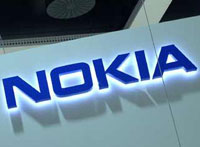Nokia buys Navteq investing in US economy more than 8 billion dollars
Nokia's agreement to buy Chicago-based Navteq for $8.1 billion—the handset maker's biggest acquisition to date—shows just how determined the Finnish company is to dominate the evolving business of mobile search. In fact, Nokia may even be betting that it can become the mobile equivalent of Google, as customers increasingly use its Internet-enabled handsets to look for help getting from one place to another as well as for information about what's available along the way.

Navteq, ranked No. 5 on BW's 2006 Hot Growth list, is profitable and fast-growing, earning $109 million last year on sales of $582 million. But those numbers alone don't justify the purchase price, analysts say. "It's expensive," says analyst Richard Windsor of Nomura Securities in London. Investors agreed, driving Nokia shares down 2% in Helsinki trading following announcement of the deal on Oct. 1. Windsor questions whether customers will be willing to pay for navigation services that are available free from Google and other sources. "Nokia's business model in navigation is already broken," Windsor says.
Nokia Chief Financial Officer Richard Simonson responds that investors didn't initially understand the value that Navteq brings, but that it's starting to become clear. "Yes, it's a rich multiple if you look at it based on the price compared to sales and future earnings," he says. "But let's put it in perspective. Navteq is a $600 million company that has a great growth profile, and we need to pay for that." He's not alone in his confidence: Says analyst Mark McKechnie of American Technology Research in San Francisco, "The purchase price may seem rich relative to Nokia's trading multiples, but a small strategic price for Nokia to pay to drive its GPS business going forward."
Nokia already dominates the global handset market, but now it is pushing hard into the mobile Internet. At an Aug. 29 London press conference, Nokia unveiled plans to launch a slew of services for mobile users starting later this year in Europe and Asia. The initiative includes an online music store aimed at the 200 million music-capable Nokia mobile phones already on the market, an interactive multiplayer-game service, and a new venue for Nokia handset users to swap photos, videos, and music. Nokia is taking the lead in pushing the mobile Internet after operators such as Vodafone largely failed to attract a significant number of customers to their own wireless Web services.
The acquisition of Navteq, which provides the digital mapping information underlying navigation devices and Internet services, is based on the premise that location-based services could become one of the most important mobile applications. Search will become three-dimensional, taking advantage of the fact that users always have their handsets with them. "Telephones are becoming computers. One of the big things that will happen is adding location sensitivity. It's fundamental," Anssi Vanjoki, Nokia's general manager for multimedia, tells BusinessWeek.
Richard Windsor, a Nomura analyst, said: “This is an expensive, defensive move.”
He added that the deal was partly about enabling Nokia to “keep one step ahead of companies such as Google, Yahoo! and Apple, who are all trying to get a piece of the mobile content and services market”.
Nokia faces growing margin pressure in its core business. Google, angling for a slice of the potential $11 billion mobile advertising market, is understood to be developing a handset, and Apple has forged into the mobile sector with its iPhone, timesonline.co.uk reports.
Source: agencies
Subscribe to Pravda.Ru Telegram channel, Facebook, RSS!





